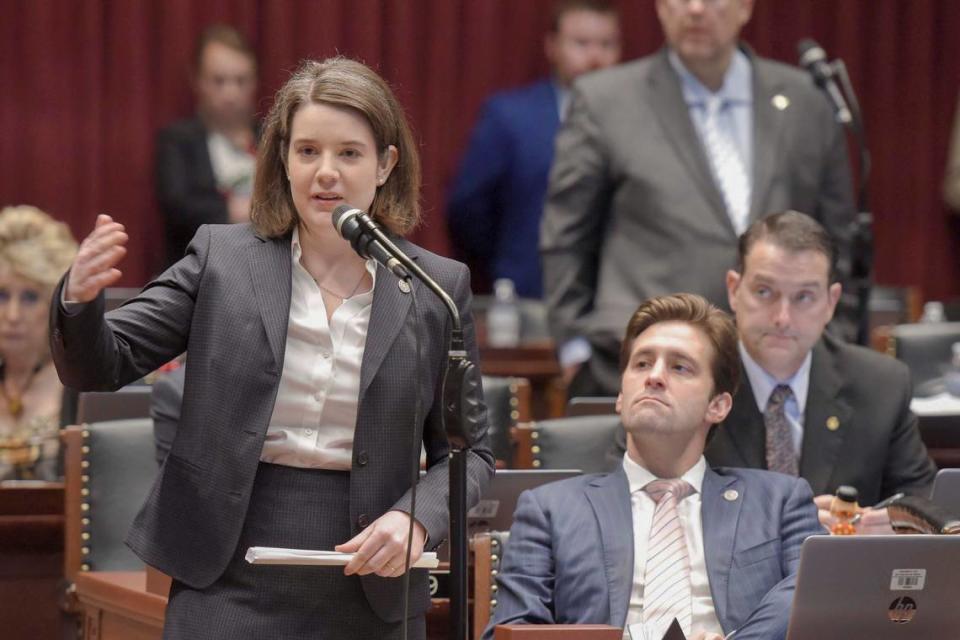Missouri Senate debates curbing direct democracy amid campaign for abortion rights vote
- Oops!Something went wrong.Please try again later.
The Missouri Senate started debating a plan this week to roll back direct democracy by making the votes of rural residents more powerful than urban residents when it comes to amending the state constitution.
The Republican-led measure comes as abortion rights advocates embark on an ambitious campaign to overturn a near-total ban on the procedure and enshrine the right to an abortion in the Missouri Constitution.
The debate marks the beginning of what is expected to be a lengthy, bitter dispute among senators, who have yet to pass a single bill this year. Democrats immediately launched a filibuster of the proposal, blocking an initial vote late Monday evening. The Senate resumed debate on Tuesday.
The measure, filed by Sen. Mary Elizabeth Coleman, an Arnold Republican running for Congress, would overhaul Missouri’s century-old initiative petition process that allows voters to place constitutional amendments on the ballot by gathering signatures.
Currently, constitutional amendments must win a simple majority of voters statewide. But Coleman’s proposal would require amendments to also receive a majority vote in at least five of the state’s eight congressional districts.
That change would hand rural residents more power in statewide votes on constitutional amendments. A coalition of rural congressional districts would have effective veto control over amendments, no matter how popular a measure might enjoy in Kansas City or St. Louis.
“Our founding documents should not be able to be changed just with a simple majority of vote,” Coleman said in a floor speech. “It should have to have a majority of congressional districts as well.”
Any proposal raising the threshold for amending the state constitution would itself have to be approved by a simple majority of voters statewide.
A hard-right faction of senators called the Missouri Freedom Caucus has put pressure on Senate Republican leadership to pass the proposal early in the session in the wake of the campaign to overturn the abortion ban. If the Senate advances the plan, it would head to the House, which passed similar proposals last year.
Some Republicans appear to want to put the proposal on the August ballot, hoping to raise the bar for amendments ahead of a potential abortion rights vote in November.

As written, the proposal by default would go on the November ballot but Republican Gov. Mike Parson, a staunch abortion opponent, would have the power to set a special election for the measure – and could set it to occur concurrently with the August primary election.
Missouri Republicans have for years attacked the state’s initiative petition process, which has been utilized by voters of both parties to bypass the General Assembly and put measures to a statewide vote. The criticism comes as voters have in recent years passed several progressive policies, including marijuana legalization and Medicaid expansion.
“I think it is important that it is harder to change our founding documents than it is state statutes,” Coleman said.
While Coleman and Republican senators say that the state constitution has been too easy to change, data shows voters have historically rejected most initiative petition questions.
There have been 69 citizen-driven initiative petitions placed in front of voters between 1910 and 2022. Of those petitions, voters have approved 28 — 40.6%. Voters shot down the remaining 41 or 59.4%.
That data only analyzes the proposals that have reached the ballot — most petitions fail to make it through the expensive and time-consuming signature-gathering process. For example, more than 80 initiative petitions were filed with the Missouri Secretary of State’s Office in 2022 but only one, marijuana legalization, reached the ballot.
About 170,000 signatures are currently required to qualify an initiative petition for the ballot. The signature-gathering process also currently includes a congressional district requirement and petitions must be signed by 8% of legal voters in six of the eight districts.
“The reality is voters are smart and discerning,” Sen. Lauren Arthur, a Kansas City Democrat, said Tuesday. “Usually, they only approve things that they feel are necessary if the legislative body of the General Assembly ignores the proposals that they think are important.”

Legal experts told The Star last year that changing the initiative petition process could violate the U.S. Constitution and the principle of “one person, one vote” meant to ensure each voter’s ballot holds equal weight.
“The idea of requiring a second vote, after all Missouri citizens have already had an opportunity to vote, violates the long-established principle of one-person, one-vote,” said Scott Charton, spokesman for Missourians for Fair Governance, a group defending the current process.
Defenders of the initiative petition process call Republican efforts to raise the threshold for passing amendments an attack on direct democracy, whittling away at a crucial tool used by voters to bypass the legislature.
“There is one step between the voters and this and that’s us,” Sen. Doug Beck, a St. Louis Democrat, said on Monday before launching a filibuster against the proposal. “We’re gonna be here to try to uphold democracy in the state of Missouri.”
But the Freedom Caucus has for the first month of session used social media, procedural maneuvers and criticism of more moderate Republicans to try to get the proposal to a vote. The caucus has touted the legislation, which they call “IP Reform,” as its No. 1 priority this year.
The caucus “remains steadfast in advancing the cause of IP Reform, guaranteeing that the will of the people resonates in the decisions made by elected officials,” the group said in a recent statement.
Coleman’s proposal would also ban initiative petitions on certain topics, including raising taxes on food, cutting funding for law enforcement, raising taxes on real estate, allowing lobbyist gifts to politicians and cutting money to protect the country’s borders.
Several GOP-led states, including Ohio and South Dakota, have pushed to raise the threshold for citizen-led petitions in recent years. Voters in both states struck down those measures at the ballot box.
Missouri Republicans, seeking to overcome voter opposition, have included what critics describe as deceptive language in the proposal. It would ask voters to ban foreign interference in ballot measures and limit voting on citizen-led petitions to U.S. citizens, despite the fact that voting is already restricted to U.S. citizens.
Sen. Tracy McCreery, a St. Louis area Democrat, and Beck on Monday criticized Republicans for trying to entice voters with “ballot candy.”
“The first three bullet points that the voters will see are all things that are already illegal,” McCreery said, referring to how the measure would be summarized on ballots. “Very disingenuous, quite honestly. But I do think the voters will see through it.”
Coleman, the bill sponsor, acknowledged on the floor that the measure has been crafted to lure voters.
“There absolutely is ballot candy in the Senate substitute,” she said.

